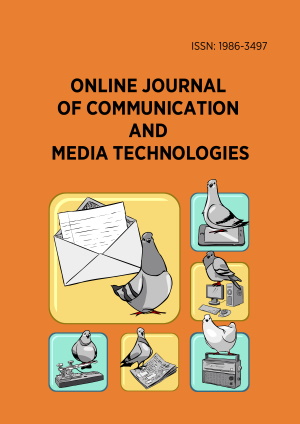Research Article
Generations X, Y, Z and their Perception of E-Government Services: Case of Turkey
More Detail
1 Istanbul Sehir University, TURKEY2 Tekirdag Namik Kemal University, TURKEY* Corresponding Author
Online Journal of Communication and Media Technologies, 10(1), January 2020, e202002, https://doi.org/10.29333/ojcmt/6428
OPEN ACCESS 4286 Views 2613 Downloads
ABSTRACT
Technological developments have transformed the forms of communication that can have a major impact on the social structure. All these technological developments cause fundamental changes in the way of life of the individuals and there are serious changes in both the ways of interpreting life and personality structures. The primary aim of this study is to examine the perceptions of online government services amongst different generations. The research of this study was carried out on the perception of e-government services with a questionnaire applied to the X, Y, Z generations to measure the similarities and differences in their understanding of these services. As a result of the research, individual typologies formed by the digital use of governmental services, which are called pre-techno individuals, techno individuals and post-techno individuals and the characteristics of these generations in terms of e-government services usage are revealed.
CITATION (APA)
Ersoz, S., & Demir Askeroğlu, E. (2020). Generations X, Y, Z and their Perception of E-Government Services: Case of Turkey. Online Journal of Communication and Media Technologies, 10(1), e202002. https://doi.org/10.29333/ojcmt/6428
REFERENCES
- Agostino, D., & Arnaboldi, M. (2016). A Measurement Framework for Assessing the Contribution of Social Media to Public Engagement: An empirical analysis on Facebook. Public Management Review, 18(9), 1289-1307. https://doi.org/10.1080/14719037.2015.1100320
- Alshehri, M., & Drew, S. (2010). Implementation of e-government: advantages and challenges. International association for scientific knowledge (IASK) E-ALT Conference proceedings, 79-86.
- E-Government in Turkey, Joinup Europa (February 2016). Retrieved from https://joinup.ec.europa.eu
- Firmstone, J., & Coleman, S. (2015). Public engagement in local government: the voice and influence of citizens in online communicative spaces, Information. Communication & Society, 18(6), 680-695. https://doi.org/10.1080/1369118X.2014.986180
- Freeman, J., & Quirke, S. (2013). Understanding E-Democracy Government-Led Initiatives for Democratic Reform. JeDEM, 5(2), 141-154. https://doi.org/10.29379/jedem.v5i2.221
- Haider, Z., Shuwen, C., & Hyder, S. (2014). Citizens’ participation in e-government services: A Comparative Study of Pakistan & Singapore. Journal of Electronics and Communication Engineering, 9(6), 35-48. https://doi.org/10.9790/2834-09613548
- Haller, M., Li, M.-H., & Mossberger, K. (2011). Does e-government use contribute to citizen engagement with government and community? APSA 2011 Annual Meeting. Rochester, NY: Social Science Research Network.
- Holzer, M., & Manoharan, A. P. (n.d.). Digital Governance in Municipalities Worldwide 2015- 2016 ~A Longitudinal Assessment of Municipal Websites throughout the World. Rutgers University.
- infoDev/World Bank, “e-Government Primer”, Washington, DC; infoDev/World Bank. (2009). Retrieved from http://www.infodev.org/publications
- Kang, S., & Gearhart, S. (2010). E-Government and Civic Engagement: How is Citizens’ Use of City Web Sites Related with Civic Involvement and Political Behaviors? Journal of Broadcasting & Electronic Media, 54(3), 443-462. https://doi.org/10.1080/08838151.2010.498847
- Lidén, G., & Larsson, A. O. (2016). From 1.0 to 2.0: Swedish municipalities online. Journal of Information Technology & Politics, 13(4), 339-351. https://doi.org/10.1080/19331681.2016.1169242
- Merrienboer, J. V., & Driscoll, M. P. (Eds.). (2007). Handbook of research on educational Organisation for Economic and Co-operation and Development (OECD). Citizens as Partners – OECD Handbook on Information, Consultation and Public Participation in Policy Making walks through some of the elements that need to be considered when building a framework. Retrieved from www.oecdbookshop.org
- Partnership on Measuring ICT for Development and the United Nations Economic Commission for Africa (2012). Framework for a set of e-government core indicators. Retrieved from http://www.uneca.org/publications/framework-set-e-government-core-indicators
- Partnership on Measuring ICT for Development and the United Nations Economic Commission for Africa. (2012). Framework for a set of e-government core indicators. Available from http://www.uneca.org/publications/framework-set-e-government-core-indicators
- Pew Research Center, A Portrait of Generation Next. (2010). Retrieved from http://www.pewsocialtrends.org/files/2010/10/millennials-confident-connected-open-to-change.pdf
- Reeves, T., & Oh, E. (2007). Generational differences. In J.M. Spector, M.D. Merrill, J. van
- Sæbø, Ø., Rose, J., & Skiftenes Flak, L. (2008). The shape of eParticipation: Characterizing an emerging research area. Government Information Quarterly 25(3), 400-428. https://doi.org/10.1016/j.giq.2007.04.007
- Suh, S. Y. (2005). Promoting Citizen Participation in e-Government <From the Korean Experience in e-Participation>. Retrieved from http://unpan1.un.org/intradoc/groups/public/documents/un/unpan020076.pdf
- Trechsel, A., Kies, R., Mendez, F., & Schmitter, P. (2003). Evaluation of the Use of New Technologies in Order to Facilitate Democracy in Europe. Strasbourg, European Parliament, STOA.
- Turkish Statistical Institute Report. (2017) Retrieved from http://www.tuik.gov.tr/HbGetirHTML.do?id=24638
- Turkish Statistical Institute, August 2017
- Turkish Statistical Institute, Press Release, August 2016.
- Turkish Statistical Institute. (2017). Information and Communication Technology (ICT) Usage Survey on Households and Individuals, 2017. Retrieved from http://www.turkstat.gov.tr/PreHaberBultenleri.do?id=24862
- United Nations, Department of Economic and Social Affairs. Global E-government Readiness Report 2004: Toward Access for Opportunity. (2004). Retrieved from http://unpan1.un.org/intradoc/groups/public/documents/un/unpan019207.pdf
- UNPAN. (2016). UN e-Government Survey 2016. E-Government in Support of Sustainable Development. New York: UNPAN.
- World Values Survey. (n.d.). Retrieved from http://www.worldvaluessurvey.org/WVSOnline.jsp

 The articles published in this journal are licensed under the CC-BY Creative Commons Attribution International License.
The articles published in this journal are licensed under the CC-BY Creative Commons Attribution International License.